Unit 3 Language in use
文档属性
| 名称 | Unit 3 Language in use |
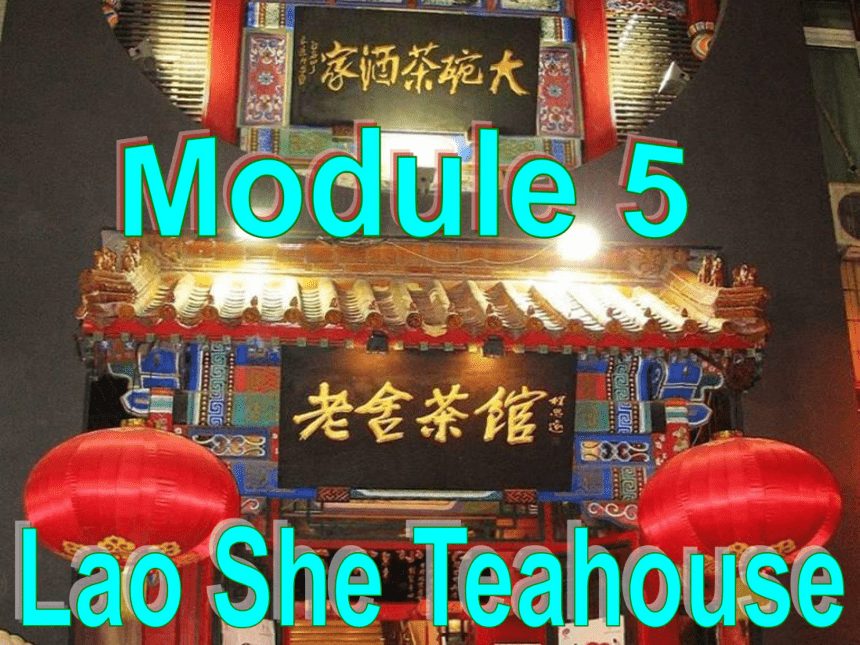
|
|
| 格式 | zip | ||
| 文件大小 | 7.7MB | ||
| 资源类型 | 教案 | ||
| 版本资源 | 外研版 | ||
| 科目 | 英语 | ||
| 更新时间 | 2013-10-17 00:00:00 | ||
图片预览

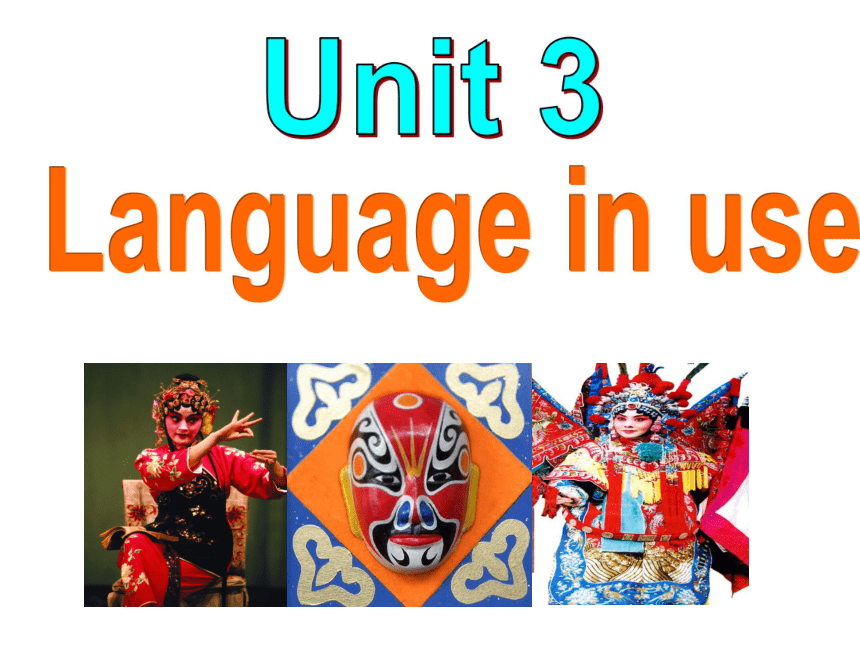
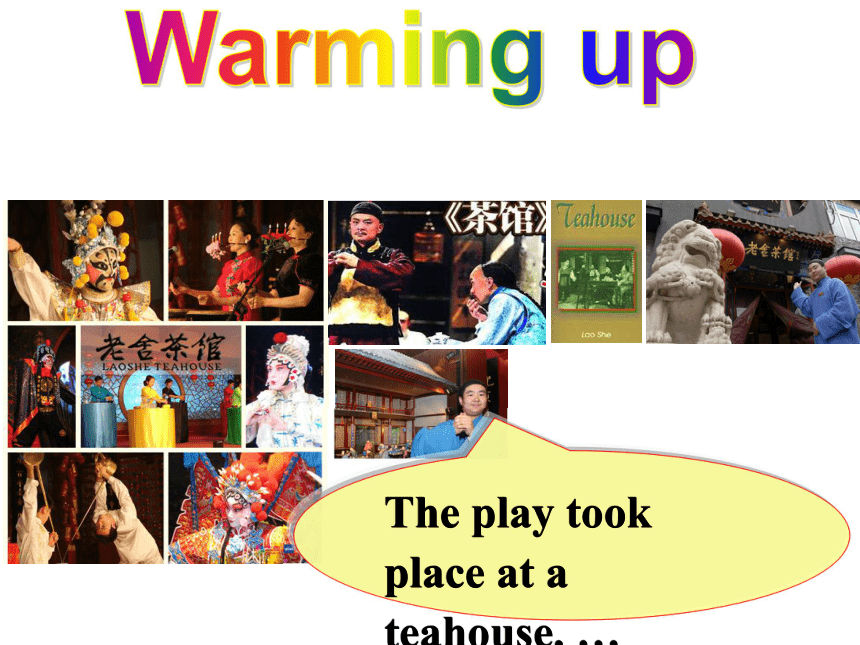
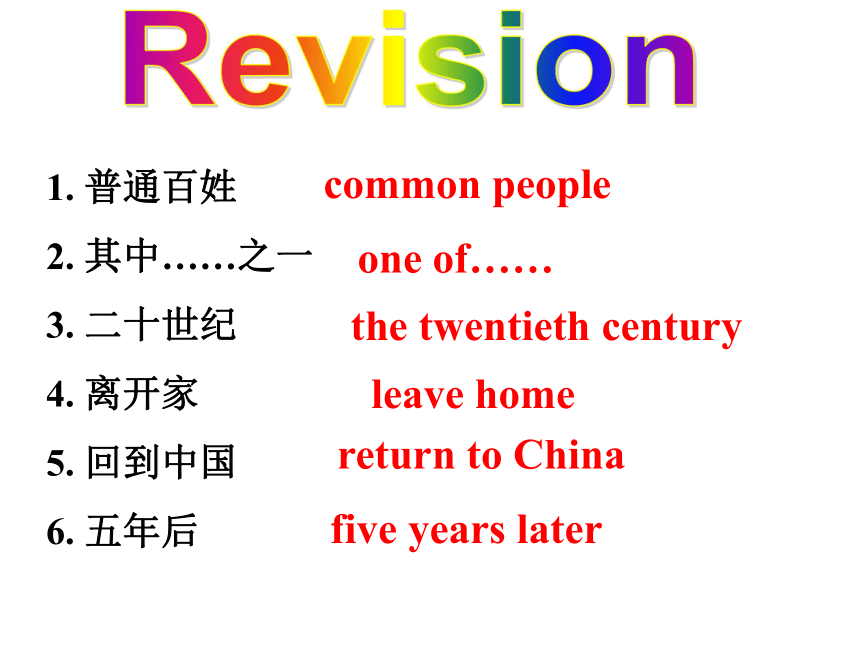
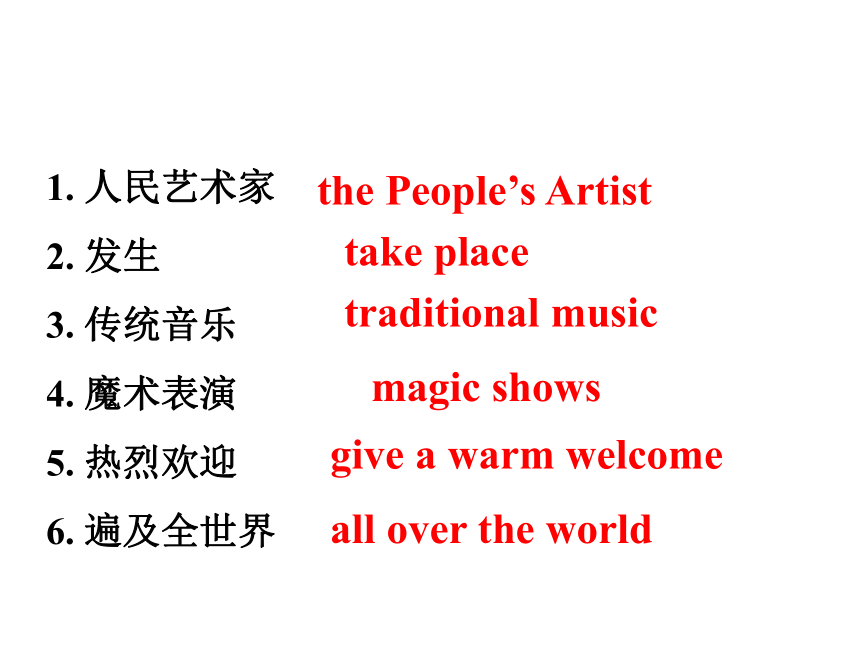
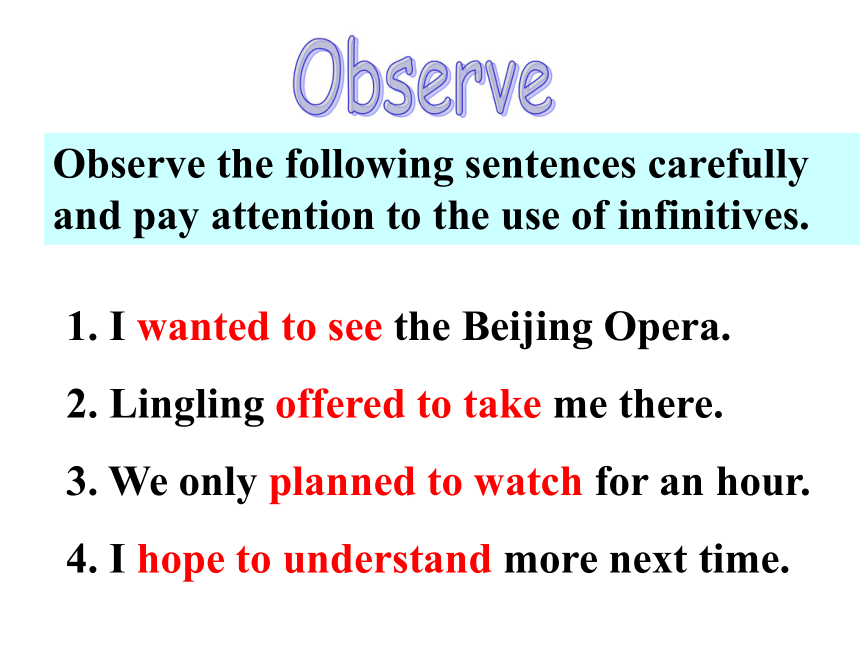
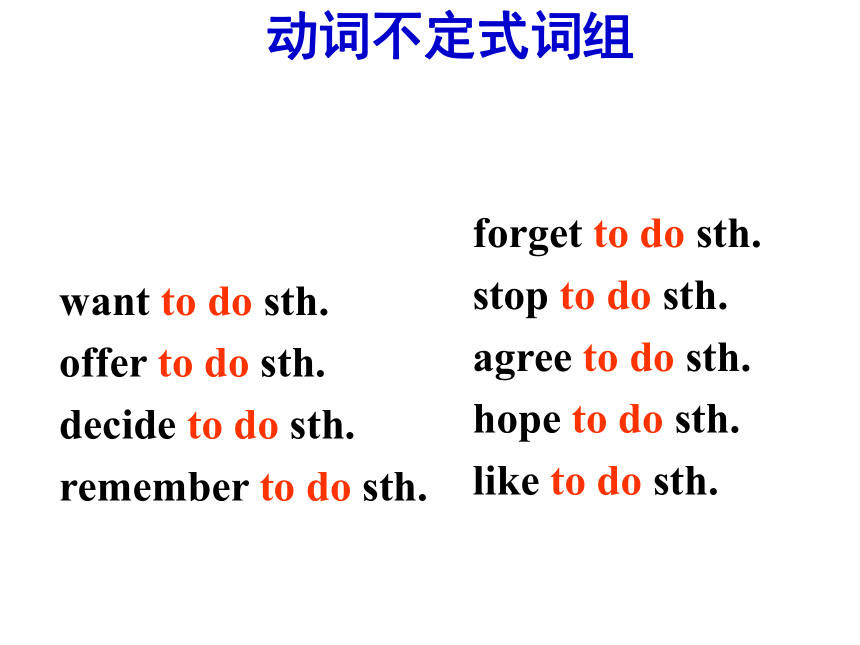
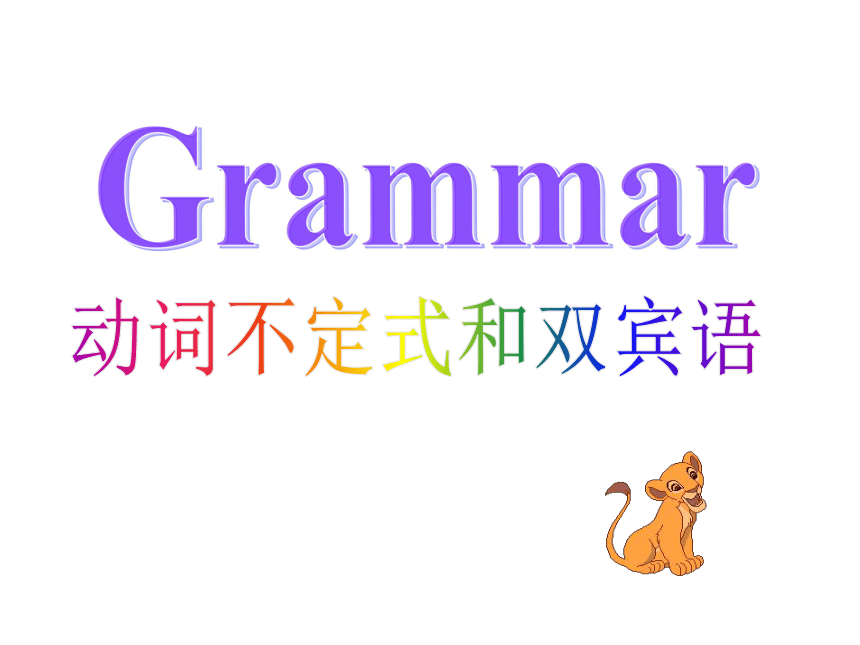
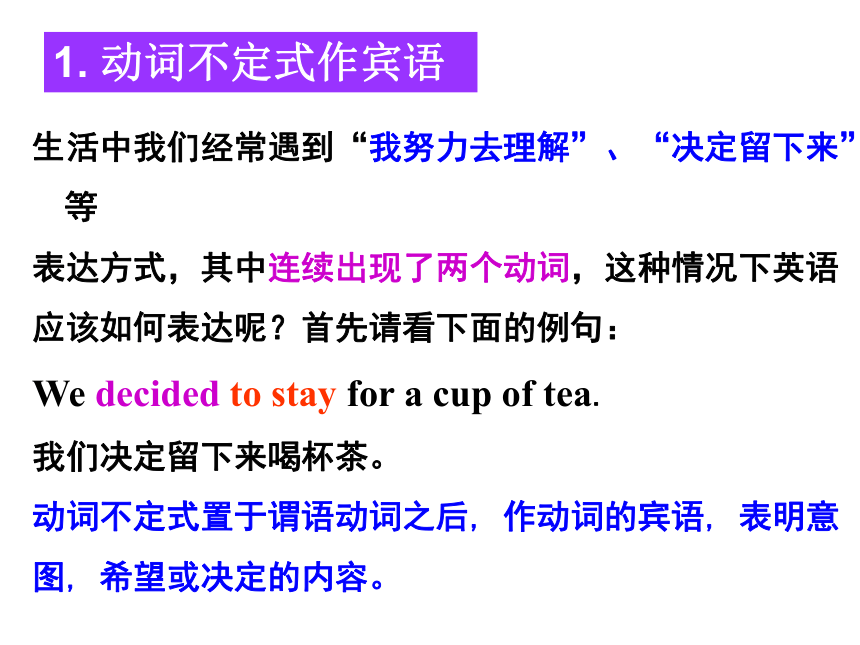
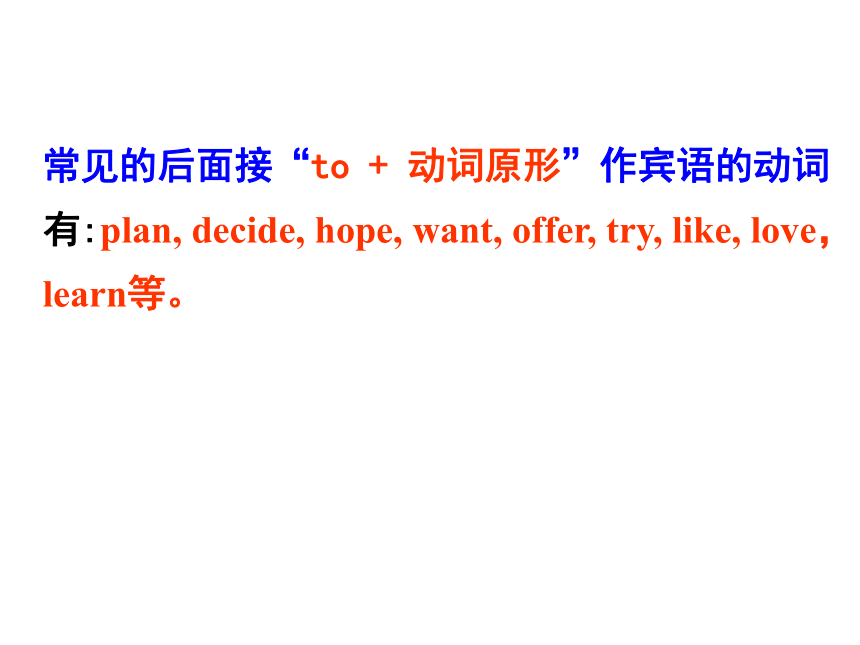
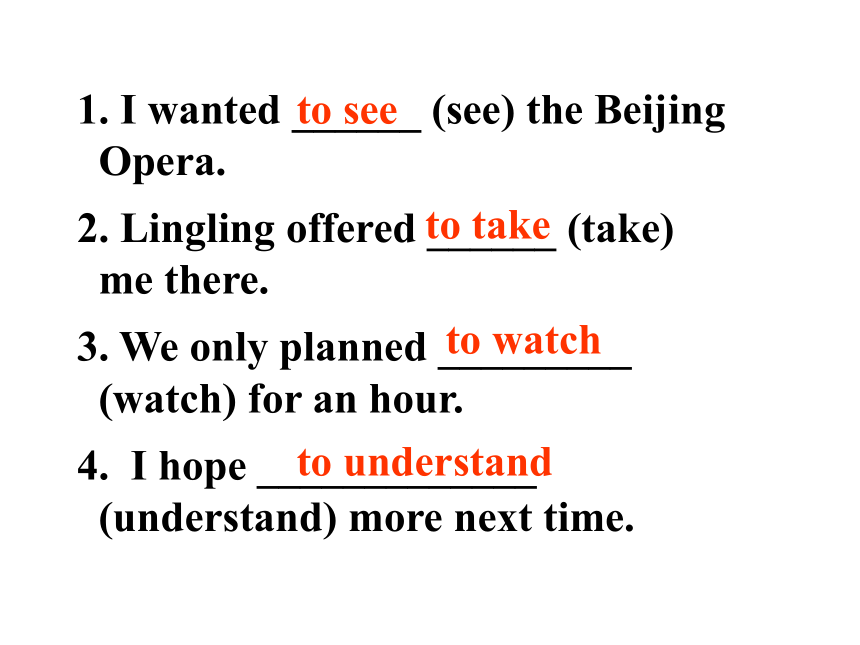
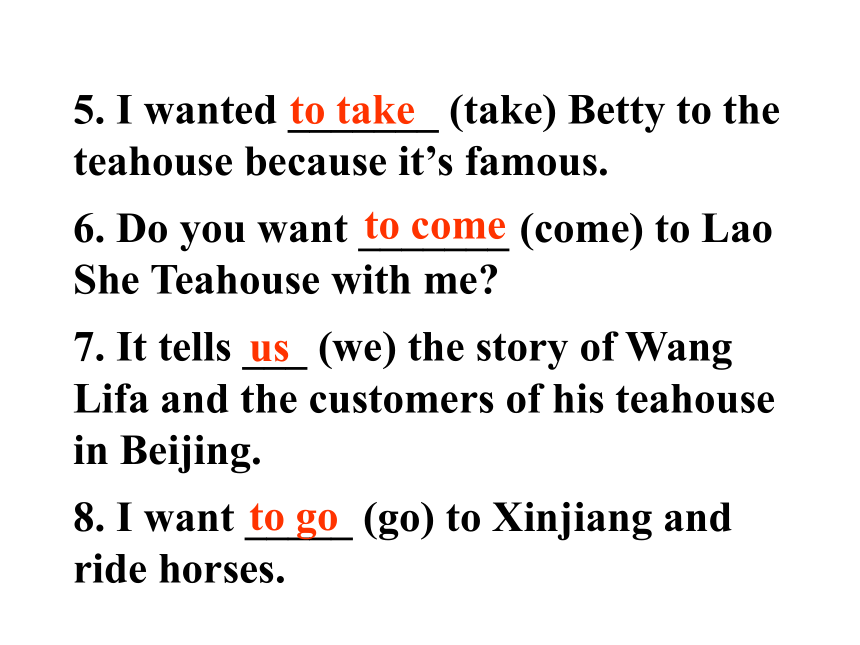
文档简介
课件47张PPT。Module 5Lao She TeahouseUnit 3Language in useTalk about Lao She Teahouse.The play took place at a teahouse. …Warming up
1. 普通百姓
2. 其中……之一
3. 二十世纪
4. 离开家
5. 回到中国
6. 五年后
common peopleone of……the twentieth centuryleave homereturn to Chinafive years laterRevision
1. 人民艺术家
2. 发生
3. 传统音乐
4. 魔术表演
5. 热烈欢迎
6. 遍及全世界
the People’s Artisttake placetraditional musicmagic showsgive a warm welcomeall over the worldObserveObserve the following sentences carefully and pay attention to the use of infinitives. I wanted to see the Beijing Opera.
Lingling offered to take me there.
We only planned to watch for an hour.
4. I hope to understand more next time.want to do sth.
offer to do sth.
decide to do sth.
remember to do sth. forget to do sth.
stop to do sth.
agree to do sth.
hope to do sth.
like to do sth.动词不定式词组Grammar动词不定式和双宾语生活中我们经常遇到“我努力去理解”、“决定留下来”等
表达方式,其中连续出现了两个动词,这种情况下英语
应该如何表达呢?首先请看下面的例句:
We decided to stay for a cup of tea.
我们决定留下来喝杯茶。
动词不定式置于谓语动词之后, 作动词的宾语, 表明意
图, 希望或决定的内容。1. 动词不定式作宾语
常见的后面接“to + 动词原形”作宾语的动词有:plan, decide, hope, want, offer, try, like, love,learn等。 1. I wanted ______ (see) the Beijing Opera.
2. Lingling offered ______ (take) me there.
3. We only planned _________ (watch) for an hour.
4. I hope _____________ (understand) more next time.to seeto taketo watchto understand5. I wanted _______ (take) Betty to the teahouse because it’s famous.
6. Do you want _______ (come) to Lao She Teahouse with me?
7. It tells ___ (we) the story of Wang Lifa and the customers of his teahouse in Beijing.
8. I want _____ (go) to Xinjiang and ride horses.to taketo cometo gous2. 双宾语当我们表达“给某人某物”时就出现了两个动作的承受者,一个是物,一个是人。
例如:我递给他一瓶苹果汁。
1) I passed him a bottle of apple juice.
采用了“动词+人+物”的表达方式。间接宾语直接宾语2) I passed a bottle of apple juice to him.间接宾语直接宾语采用了“动词+物+to+人”的方式。可以接双宾语的动词很多,常见的有:give, bring, pass, send, show, leave, tell, teach, sell等。例如:
My brother bought me some storybooks.
我哥哥给我买了一些故事书。后接介词to 的动词有:give, show, pass,
lend, take, tell 等;后接介词for的动词
有:buy, make, cook, get, sing, read等。
一般来讲,for表示“为某人”,而to表示
“给某人”,即表示某人接受或收到了某
物。如:
give sb. sth. = give sth. to sb.
bring sb. sth. = bring sth. to sb.
lend sb. sth. = lend sth. to sb.hand sb. sth. = hand sth. to sb.
send sb. sth. = send sth. to sb.
show sb. sth. = show sth. to sb.
leave sb. sth. = leave sth. to sb.
teach sb. sth. = teach sth. to sb.
buy sb. sth. = buy sth. for sb.
cook sb. sth. = cook sth. for sb.
read sb. sth. = read sth. for sb.1. Sally will lend Allan a magazine to read.
Sally will lend a magazine __ _____ to read.
2. Jackie returned the bike to me yesterday.
Jackie returned ____ ___ ____ yesterday.
3. Get me a chair, will you?
Get a chair ___ ___, will you?
4. Henry’s pen friend sent him an email.
Henry’s pen friend sent an email __ ____.
5. Please sing us a folk song.
Please sing a folk song ___ __. IV. 同义句转换 to Allanme the bikefor meto himfor usComplete the sentences with the correct form of the words in the box.see spend stay teach writeDo you want to go the teahouse?
We decided _______ at home because
it was raining.to stay12. Lao She started ________ Chinese in
London in 1924.
3. I tried ________ poems.
4. They plan ______ a film tomorrow.
5. I want ________ my holiday in Beijing.to teachto writeto seeto spend Read the conversation and complete the note with the correct form of the words in the box.advise decide offer want2Betty (1) _______to see the Beijing Opera again. Lingling (2)_______ to take her. Daming (3) _______ them to go to Mei Lanfang Theatre. Lingling (4) ______ to go next Saturday.wantedofferedadviseddecidedComplete the passage with the correct form of the words in brackets.Lu Xun is one of the greatest writers of modern China. He was born in Shaoxing, Zhejiang Province, in 1881. At first, Lu Xun hoped (1) _______ (help) the Chinese people become healthy and strong, so he decided (2)_____ (be) a doctor. to helpto be3After a few years, he started (3) _______ (write) short stories because he wanted (4)_______ (teach) people about society. One of his most famous stories is The True Story of Ah Q. It describes the hard life of Ah Q and makes people (5) _____ (think) about society. In the 1920s, people began to translate his works into English.to writeto teachthink Complete the passage with the correct form of the words and expression in the box. cheer magic take place theatre wonderful4We went to the (1)________ last night to see a play. I had a (2)___________ evening. The play was very good and all the actors were excellent. The story (3)____________ in a small village in China. It was all about an old box of gold! The box was a (4)_________ box and was difficult to open. The play was very interesting, and everyone (5)___________ at the end of the play!theatrewonderful took placemagiccheered cheer magic take place theatre wonderfulListen and choose the correct answer.Who is visiting London?
a) Vicky b) Steve c) Remoe
2. What are they talking about?
a) Romeo and Juliet
b) London
c) Vicky’s parents5Listen again and check (√) the true sentences.1.Steve went to Shakespeare’s Globe Theatre last night.
2. Vicky offered to take Steve to the theatre.
3. Steve did not try to understand the words.
4. Vicky hopes to see her favourite play.
5. Vicky thinks her parents will take her to the theatre.√√√67. Work in pairs. Talk about your weekend plan. Use the words and expressions from the box to help you.hope How about Let’s want
Why don’t we Why not would like— I want to see Beijing Opera.
— Why don’t we ...?Read the passage and choose the correct answer.Review of Teahouse
By Li Daming
This year’s school play was a very good choice. Teahouse, by Lao She, is famous and interesting. We learnt a lot about people’s lives in China some one hundred years ago. The actors’ and actresses’ clothes and the teahouse furniture were right for the first half of the twentieth century. The actors and actresses all did a very good job. Li Nan, the student playing Wang Lifa, the owner of the teahouse, was the best. He brought Wang Lifa to life, from a young man to an old man. 8I had a great time at the theatre. It was easy for
everyone to understand the story and see the changes
in Chinese society.
You would find the passage in ______.
a) a book b) a school newspaper c) a magazine
The write__. a) liked the play b) did not like the play
c) did not say he liked the play or not
The actors and actresses in the play wore_____.
a) the same clothes as today b) their best clothes
c) clothes of the first half of the twentieth century
Li Nan is ________.
a) a famous actor b) a student c) an actress bacbTheatres Around the world Western theatre started in Greece, around 600 BC. The theatres were very big. About 15,000 people could watch a play at the same time. The audience sat on stone seats to watch the performances. Some of the theatres survive, as do some of the plays by ancient Greek writers. People still watch these plays today.Acting out a scene
from a playModule task:Step 1: Work in groups. Find a play.
Think about these questions.
1. Where does it take place?
2. Who is in it?
3. What is the story?
4. What are the special moments
in it?
Step 2: Choose a scene and practise it.
Step 3: Act out the scene in front of the class.Review1. 动词不定式作宾语的用法;
2. 双宾语的用法;
3. 一些常和不定式连用的动词。复习动词不定式、双宾语QuizⅠ. 用适当的介词完成句子。1. Mary introduced me __ her friend at
the party.
2. I hope the world will be full __ happiness
and fun!
3. What did you think of the play Teahouse
__ Lao She?
4. France is famous ___ its wine and foods.toofbyasⅡ.用括号内所给动词的适当形式填空。
1. It is important for modern young people _______ (learn) at least two foreign languages.
2. The most important thing for one’s
health is ______ (have) plenty of exercise.
3. Ted decided _______ (work) hard and wanted _____ (go) to Beijing University.
4. We found it impossible _____ (get)
everything ready in time.
5. Sue really doesn’t know which book
________ (choose).to learnto haveto workto getto chooseto go6. Mother saved every cent ______ (pay)
for my schooling.
7. Tom asked you _________ (not call) him
until ten o’clock.
8. I don’t think Roger is the best one _____
(do) the work.
9. Why not _____ (walk) to school with me
every day?
10. My host family made me _____ (feel)
being at home.to paynot to callto do walkfeel1. Sally will lend Allan a magazine to read.
Sally will lend a magazine __ _____ to
read.
2. Jackie returned the bike to me yesterday.
Jackie returned __ ___ ____ yesterday.
3. Henry’s pen friend sent him an email.
Henry’s pen friend sent an email __ ___.
4. Please sing us a folk song.
Please sing a folk song ___ __. Ⅲ. 同义句转换。to Allanme the biketo himfor usⅣ. 根据所给汉语提示完成句子。
1. Kent was angry because we didn’t
_____ with (同意) him.
2. Wendy ______ __ (提议) help Linda
with her maths yesterday.
3. The story ____ ____ (发生) in America several years ago.
4. After many months of hard work, Paul won the first prize __ ___ ___ (最后).agreeoffered totook placein the endⅤ. 句型转换。1. The story took place in the winter.
(就划线部分提问)
_____ _____ the story ____ place?
2. The audience clapped for ten
minutes.(就划线部分提问)
____ _____ ____ the audience ____?
3. He thinks his parents will agree.
(改为否定句)
He ______ think his parents ____ agree.When did takeHow longdid clap doesn’t will Individual activity4. He needs to go home now.
(改为一般疑问句)
_____ he ______ to go home now?
5. We’ll come back in a few weeks.
(就划线部分提问)
_____ _____ ____ you come back?Does need How soon will It is important for modern young people _______ (learn) at least two foreign languages.
2. The most important thing for one’s health is _______ (have) plenty of exercise.
3. Ted decided _______ (work) hard and wanted _____ (go) to Beijing University.
4. We found it impossible _____ (get) everything ready in time.
5. Sue really doesn’t know which book __________ (choose).Ⅲ. 用括号内所给动词的适当形式填空to learnto haveto workto getto chooseto go6. Mother saved every cent ______ (pay) for my schooling.
7. Tom asked you _________ (not call) him until ten o’clock.
8. I don’t think Roger is the best one _____ (do) the work.
9. Why not _____ (walk) to school with me every day?
10. My host family made me _____ (feel) being at home.to paynot to callto do walkfeelHomework Review the use of infinitive as objects.
Talk about intentions and plans.Goodbye
1. 普通百姓
2. 其中……之一
3. 二十世纪
4. 离开家
5. 回到中国
6. 五年后
common peopleone of……the twentieth centuryleave homereturn to Chinafive years laterRevision
1. 人民艺术家
2. 发生
3. 传统音乐
4. 魔术表演
5. 热烈欢迎
6. 遍及全世界
the People’s Artisttake placetraditional musicmagic showsgive a warm welcomeall over the worldObserveObserve the following sentences carefully and pay attention to the use of infinitives. I wanted to see the Beijing Opera.
Lingling offered to take me there.
We only planned to watch for an hour.
4. I hope to understand more next time.want to do sth.
offer to do sth.
decide to do sth.
remember to do sth. forget to do sth.
stop to do sth.
agree to do sth.
hope to do sth.
like to do sth.动词不定式词组Grammar动词不定式和双宾语生活中我们经常遇到“我努力去理解”、“决定留下来”等
表达方式,其中连续出现了两个动词,这种情况下英语
应该如何表达呢?首先请看下面的例句:
We decided to stay for a cup of tea.
我们决定留下来喝杯茶。
动词不定式置于谓语动词之后, 作动词的宾语, 表明意
图, 希望或决定的内容。1. 动词不定式作宾语
常见的后面接“to + 动词原形”作宾语的动词有:plan, decide, hope, want, offer, try, like, love,learn等。 1. I wanted ______ (see) the Beijing Opera.
2. Lingling offered ______ (take) me there.
3. We only planned _________ (watch) for an hour.
4. I hope _____________ (understand) more next time.to seeto taketo watchto understand5. I wanted _______ (take) Betty to the teahouse because it’s famous.
6. Do you want _______ (come) to Lao She Teahouse with me?
7. It tells ___ (we) the story of Wang Lifa and the customers of his teahouse in Beijing.
8. I want _____ (go) to Xinjiang and ride horses.to taketo cometo gous2. 双宾语当我们表达“给某人某物”时就出现了两个动作的承受者,一个是物,一个是人。
例如:我递给他一瓶苹果汁。
1) I passed him a bottle of apple juice.
采用了“动词+人+物”的表达方式。间接宾语直接宾语2) I passed a bottle of apple juice to him.间接宾语直接宾语采用了“动词+物+to+人”的方式。可以接双宾语的动词很多,常见的有:give, bring, pass, send, show, leave, tell, teach, sell等。例如:
My brother bought me some storybooks.
我哥哥给我买了一些故事书。后接介词to 的动词有:give, show, pass,
lend, take, tell 等;后接介词for的动词
有:buy, make, cook, get, sing, read等。
一般来讲,for表示“为某人”,而to表示
“给某人”,即表示某人接受或收到了某
物。如:
give sb. sth. = give sth. to sb.
bring sb. sth. = bring sth. to sb.
lend sb. sth. = lend sth. to sb.hand sb. sth. = hand sth. to sb.
send sb. sth. = send sth. to sb.
show sb. sth. = show sth. to sb.
leave sb. sth. = leave sth. to sb.
teach sb. sth. = teach sth. to sb.
buy sb. sth. = buy sth. for sb.
cook sb. sth. = cook sth. for sb.
read sb. sth. = read sth. for sb.1. Sally will lend Allan a magazine to read.
Sally will lend a magazine __ _____ to read.
2. Jackie returned the bike to me yesterday.
Jackie returned ____ ___ ____ yesterday.
3. Get me a chair, will you?
Get a chair ___ ___, will you?
4. Henry’s pen friend sent him an email.
Henry’s pen friend sent an email __ ____.
5. Please sing us a folk song.
Please sing a folk song ___ __. IV. 同义句转换 to Allanme the bikefor meto himfor usComplete the sentences with the correct form of the words in the box.see spend stay teach writeDo you want to go the teahouse?
We decided _______ at home because
it was raining.to stay12. Lao She started ________ Chinese in
London in 1924.
3. I tried ________ poems.
4. They plan ______ a film tomorrow.
5. I want ________ my holiday in Beijing.to teachto writeto seeto spend Read the conversation and complete the note with the correct form of the words in the box.advise decide offer want2Betty (1) _______to see the Beijing Opera again. Lingling (2)_______ to take her. Daming (3) _______ them to go to Mei Lanfang Theatre. Lingling (4) ______ to go next Saturday.wantedofferedadviseddecidedComplete the passage with the correct form of the words in brackets.Lu Xun is one of the greatest writers of modern China. He was born in Shaoxing, Zhejiang Province, in 1881. At first, Lu Xun hoped (1) _______ (help) the Chinese people become healthy and strong, so he decided (2)_____ (be) a doctor. to helpto be3After a few years, he started (3) _______ (write) short stories because he wanted (4)_______ (teach) people about society. One of his most famous stories is The True Story of Ah Q. It describes the hard life of Ah Q and makes people (5) _____ (think) about society. In the 1920s, people began to translate his works into English.to writeto teachthink Complete the passage with the correct form of the words and expression in the box. cheer magic take place theatre wonderful4We went to the (1)________ last night to see a play. I had a (2)___________ evening. The play was very good and all the actors were excellent. The story (3)____________ in a small village in China. It was all about an old box of gold! The box was a (4)_________ box and was difficult to open. The play was very interesting, and everyone (5)___________ at the end of the play!theatrewonderful took placemagiccheered cheer magic take place theatre wonderfulListen and choose the correct answer.Who is visiting London?
a) Vicky b) Steve c) Remoe
2. What are they talking about?
a) Romeo and Juliet
b) London
c) Vicky’s parents5Listen again and check (√) the true sentences.1.Steve went to Shakespeare’s Globe Theatre last night.
2. Vicky offered to take Steve to the theatre.
3. Steve did not try to understand the words.
4. Vicky hopes to see her favourite play.
5. Vicky thinks her parents will take her to the theatre.√√√67. Work in pairs. Talk about your weekend plan. Use the words and expressions from the box to help you.hope How about Let’s want
Why don’t we Why not would like— I want to see Beijing Opera.
— Why don’t we ...?Read the passage and choose the correct answer.Review of Teahouse
By Li Daming
This year’s school play was a very good choice. Teahouse, by Lao She, is famous and interesting. We learnt a lot about people’s lives in China some one hundred years ago. The actors’ and actresses’ clothes and the teahouse furniture were right for the first half of the twentieth century. The actors and actresses all did a very good job. Li Nan, the student playing Wang Lifa, the owner of the teahouse, was the best. He brought Wang Lifa to life, from a young man to an old man. 8I had a great time at the theatre. It was easy for
everyone to understand the story and see the changes
in Chinese society.
You would find the passage in ______.
a) a book b) a school newspaper c) a magazine
The write__. a) liked the play b) did not like the play
c) did not say he liked the play or not
The actors and actresses in the play wore_____.
a) the same clothes as today b) their best clothes
c) clothes of the first half of the twentieth century
Li Nan is ________.
a) a famous actor b) a student c) an actress bacbTheatres Around the world Western theatre started in Greece, around 600 BC. The theatres were very big. About 15,000 people could watch a play at the same time. The audience sat on stone seats to watch the performances. Some of the theatres survive, as do some of the plays by ancient Greek writers. People still watch these plays today.Acting out a scene
from a playModule task:Step 1: Work in groups. Find a play.
Think about these questions.
1. Where does it take place?
2. Who is in it?
3. What is the story?
4. What are the special moments
in it?
Step 2: Choose a scene and practise it.
Step 3: Act out the scene in front of the class.Review1. 动词不定式作宾语的用法;
2. 双宾语的用法;
3. 一些常和不定式连用的动词。复习动词不定式、双宾语QuizⅠ. 用适当的介词完成句子。1. Mary introduced me __ her friend at
the party.
2. I hope the world will be full __ happiness
and fun!
3. What did you think of the play Teahouse
__ Lao She?
4. France is famous ___ its wine and foods.toofbyasⅡ.用括号内所给动词的适当形式填空。
1. It is important for modern young people _______ (learn) at least two foreign languages.
2. The most important thing for one’s
health is ______ (have) plenty of exercise.
3. Ted decided _______ (work) hard and wanted _____ (go) to Beijing University.
4. We found it impossible _____ (get)
everything ready in time.
5. Sue really doesn’t know which book
________ (choose).to learnto haveto workto getto chooseto go6. Mother saved every cent ______ (pay)
for my schooling.
7. Tom asked you _________ (not call) him
until ten o’clock.
8. I don’t think Roger is the best one _____
(do) the work.
9. Why not _____ (walk) to school with me
every day?
10. My host family made me _____ (feel)
being at home.to paynot to callto do walkfeel1. Sally will lend Allan a magazine to read.
Sally will lend a magazine __ _____ to
read.
2. Jackie returned the bike to me yesterday.
Jackie returned __ ___ ____ yesterday.
3. Henry’s pen friend sent him an email.
Henry’s pen friend sent an email __ ___.
4. Please sing us a folk song.
Please sing a folk song ___ __. Ⅲ. 同义句转换。to Allanme the biketo himfor usⅣ. 根据所给汉语提示完成句子。
1. Kent was angry because we didn’t
_____ with (同意) him.
2. Wendy ______ __ (提议) help Linda
with her maths yesterday.
3. The story ____ ____ (发生) in America several years ago.
4. After many months of hard work, Paul won the first prize __ ___ ___ (最后).agreeoffered totook placein the endⅤ. 句型转换。1. The story took place in the winter.
(就划线部分提问)
_____ _____ the story ____ place?
2. The audience clapped for ten
minutes.(就划线部分提问)
____ _____ ____ the audience ____?
3. He thinks his parents will agree.
(改为否定句)
He ______ think his parents ____ agree.When did takeHow longdid clap doesn’t will Individual activity4. He needs to go home now.
(改为一般疑问句)
_____ he ______ to go home now?
5. We’ll come back in a few weeks.
(就划线部分提问)
_____ _____ ____ you come back?Does need How soon will It is important for modern young people _______ (learn) at least two foreign languages.
2. The most important thing for one’s health is _______ (have) plenty of exercise.
3. Ted decided _______ (work) hard and wanted _____ (go) to Beijing University.
4. We found it impossible _____ (get) everything ready in time.
5. Sue really doesn’t know which book __________ (choose).Ⅲ. 用括号内所给动词的适当形式填空to learnto haveto workto getto chooseto go6. Mother saved every cent ______ (pay) for my schooling.
7. Tom asked you _________ (not call) him until ten o’clock.
8. I don’t think Roger is the best one _____ (do) the work.
9. Why not _____ (walk) to school with me every day?
10. My host family made me _____ (feel) being at home.to paynot to callto do walkfeelHomework Review the use of infinitive as objects.
Talk about intentions and plans.Goodbye
同课章节目录
- Module 1 How to learn English
- Unit 1 Let's try to speak English as much as possi
- Unit 2 You should smile at her.
- Unit 3 Language in use .
- Module 2 My home town and my country
- Unit 1 It's taller than many other buildings.
- Unit 2 Cambridge is a beautiful city in the east o
- Unit 3 Language in use .
- Module 3 Sports.
- Unit 1 Nothing is more exciting than playing tenni
- Unit 2 This year we training more carefully.
- Unit 3 Language in use .
- Module 4 Planes, ships and trains .
- Unit 1 He lives the farthest from school.
- Unit 2 What is the best way to travel.
- Unit 3 Language in use .
- Module 5 Lao She Teahouse.
- Unit 1 I wanted to see the Beijing Opera.
- Unit 2 It descibes the changes in Chinese society.
- Unit 3 Language in use .
- Module 6 Animals in danger.
- Unit 1 It allows people to get closer to them .
- Unit 2 The WWF is working hard to save them all.
- Unit 3 Language in use .
- Revision module A
- Module 7 A famous story
- Unit 1 Alice was sitting with her sister by the ri
- Unit 2 She was thinking about her cat.
- Unit 3 Language in use .
- Module 8 Accidents
- Unit 1 While the car were changing to red, a car s
- Unit 2 I was trying to pick it up when it bite me
- Unit 3 Language in use .
- Module 9 Population
- Unit 1 The population of China is about 1.37 billi
- Unit 2 Arnwick was a city with 200,000 people.
- Unit 3 Language in use .
- Module 10 The weathe
- Unit 1 It might snow.
- Unit 2 The weather is fine all year round.
- Unit 3 Language in use .
- Module 11 Way of life
- Unit 1 In China ,we open a gift later.
- Unit 2 In England, you usually drink tea with milk
- Unit 3 Language in use .
- Module 12 Help
- Unit 1 What should we do before help arrives?
- Unit 2 Stay away from windows and heavy furniture.
- Unit 3 Language in use .
- Revision module B
